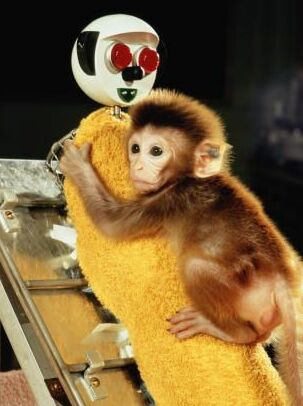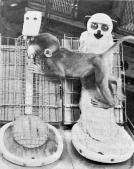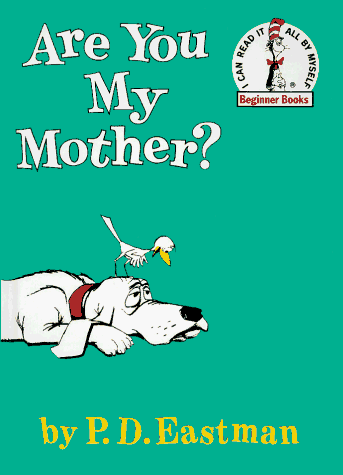What is the ClothMother?

In the 1950s and 1960s Harry Harlowe, a psychologist at Harvard University conducted a series of experiments designed to investigate the development of social attachments and love relationships. Harlowe was evaluating object relations from a classical psychodynamic (Freudian) approach, which suggested that the strongest attachments would be formed with caregivers who reliably met basic physiological needs, especially for food. Harlowe's experimental paradigm was ingenious:  he raised infant rhesus monkeys in isolation from their natural mothers, and offered two alternative "mother" figures: the "wire mother" who offered sustenance (through a simple bottle) but no warmth or comfort, and a "cloth mother" a terrycloth model which provided some semblance of comfort but no food. When these infant monkeys were challenged with alarming environmental stimuli, they always turned to the "cloth mother" over the "wire mother", establishing the notion of the "secure base" (the parental figure to whom a child will turn in times of stress) and casting significant doubt on the "food is love" hypothesis of classical Freudian theory.
he raised infant rhesus monkeys in isolation from their natural mothers, and offered two alternative "mother" figures: the "wire mother" who offered sustenance (through a simple bottle) but no warmth or comfort, and a "cloth mother" a terrycloth model which provided some semblance of comfort but no food. When these infant monkeys were challenged with alarming environmental stimuli, they always turned to the "cloth mother" over the "wire mother", establishing the notion of the "secure base" (the parental figure to whom a child will turn in times of stress) and casting significant doubt on the "food is love" hypothesis of classical Freudian theory.
From these experiments, Harlowe formulated the "contact-comfort hypothesis" which postulated that warmth, comfort, and safety were stronger motivators than were simple sustenance or food. His empirical investigations dovetail nicely with theories of human  attachment, notably those formulated by John Bowlby and Mary Ainsworth.
attachment, notably those formulated by John Bowlby and Mary Ainsworth.
It is noteworthy that Harlowe's monkeys did not develop with normal emotional mechanisms in place. When they were bred, they became abusive or neglectful parents. These findings lent support to theories that postulated intergenerational transmission of attachment behaviors, or "cycles of abuse." Without appropriate parenting models, these monkeys became equally poor parents.
Critics of these experiments sometimes argue that these studies were cruel and that these infant rhesus monkeys were unduly mistreated. These folks are clearly missing the point. Harlowe demonstrated that emotional needs often take precedence over basic needs of food and survival, and that emotional deprivation in early childhood can have far-reaching and disastrous consequences that can persist throughout life.


he raised infant rhesus monkeys in isolation from their natural mothers, and offered two alternative "mother" figures: the "wire mother" who offered sustenance (through a simple bottle) but no warmth or comfort, and a "cloth mother" a terrycloth model which provided some semblance of comfort but no food. When these infant monkeys were challenged with alarming environmental stimuli, they always turned to the "cloth mother" over the "wire mother", establishing the notion of the "secure base" (the parental figure to whom a child will turn in times of stress) and casting significant doubt on the "food is love" hypothesis of classical Freudian theory.
attachment, notably those formulated by John Bowlby and Mary Ainsworth.